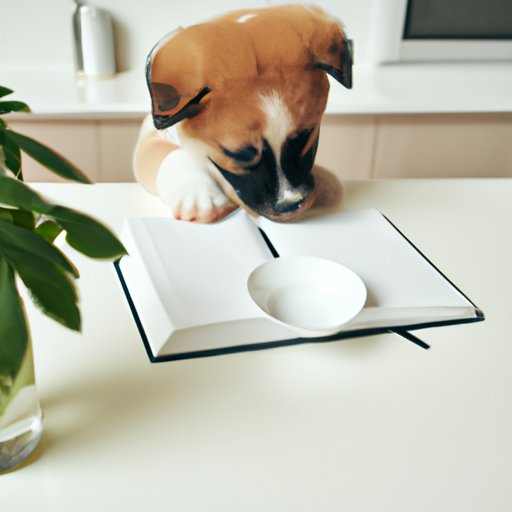Introduction
Bringing a puppy into your home is an exciting experience that comes with many responsibilities. Taking good care of your puppy will ensure he or she grows into a healthy and well-behaved adult dog. To help you get started on the right paw, this article will discuss the basics of how to take care of a puppy at home. We’ll cover topics such as creating a routine, providing proper nutrition, exercising regularly, socializing your pup, and staying on top of health care.
Create a Routine
One of the most important things you can do for your puppy is establish a regular daily routine. A routine will help your pup learn what behaviors are expected of him or her and give your pup a sense of security. Creating a routine will also make life easier for you as the owner, as it will help you remember to do all the necessary tasks such as feeding and potty breaks.
There are several benefits to establishing a regular daily routine for your puppy. A predictable schedule will help your pup feel secure, as they will know when certain activities will take place. This will also help your pup learn acceptable behaviors, as they will understand what activities will take place during each part of the day. Finally, a routine will help you remember to do all the necessary tasks for your pup, such as feeding and potty breaks.
When creating a routine for your puppy, there are some tips you should keep in mind. First, try to keep the same activities in the same order every day. This will help your pup learn quicker, as they will already be familiar with what to expect. Second, make sure to include plenty of playtime and other activities that your pup enjoys. This will help keep them engaged and entertained. Finally, always end the day with a potty break before bedtime, as this will help your pup learn to hold it overnight.
Provide Proper Nutrition
Proper nutrition is essential for keeping your puppy healthy. Different puppies have different nutritional needs, so it’s important to talk to your vet about what type of food is best for your pup. Generally speaking, puppies need a high-quality diet that contains proteins, fats, carbohydrates, vitamins, and minerals. Most commercial dog foods provide a balanced diet, but make sure to read the label and choose one that is appropriate for your pup’s age and size.
In addition to providing a balanced diet, it’s important to feed your puppy the right amount of food. Overfeeding can lead to obesity and other health problems, so it’s important to follow the recommended feeding guidelines for your pup’s age and size. If you’re unsure how much to feed your pup, talk to your vet for advice.
Exercise Regularly
Exercise is important for puppies, as it helps keep them healthy and prevents boredom. There are several benefits to exercising your puppy regularly. Regular exercise helps keep your pup’s muscles and joints strong, which can help prevent injuries. It can also help reduce stress and anxiety, as well as help your pup stay mentally stimulated. Finally, regular exercise can help your pup burn off excess energy, which can help prevent behavioral issues such as destructive chewing.
When it comes to exercising your puppy, there are a variety of activities you can do. For example, you can take your pup for walks or runs, play fetch in the yard, or do agility training. You can also enroll your pup in a dog sport such as agility, flyball, or dock diving. Whatever activity you choose, make sure to start slowly and gradually increase the intensity as your pup gets older and stronger.
Socialize Your Pup
Socializing your puppy is important for helping them grow into confident and well-adjusted adult dogs. Socialization helps your pup learn how to interact with other people and dogs in a positive way. This can help prevent fear-based behaviors such as aggression, fearfulness, and shyness.
When socializing your pup, it’s important to introduce them to different people and dogs in a positive way. Start by introducing your pup to family members and friends in a calm and controlled environment. You can also take your pup to puppy classes, where they will be exposed to different people and dogs in a safe and supervised setting. Finally, you can set up play dates with other puppies in your area, which will help your pup learn how to interact with other dogs in a positive way.
Stay on Top of Health Care
Staying on top of your puppy’s health care is essential for keeping them happy and healthy. This includes making sure they are up to date on their vaccinations and getting regular checkups from the vet. Vaccinations help protect your pup from serious diseases, while regular checkups can help detect any potential health issues early on.
When choosing a vet for your puppy, look for one who is experienced with puppies and has a good reputation. Ask your friends and family for recommendations, or search online for reviews of local vets. Once you’ve found a vet, make sure to schedule regular checkups and keep up with your pup’s vaccinations.
Conclusion
Taking good care of your puppy will ensure he or she grows into a healthy and well-behaved adult dog. To help you get started on the right paw, this article discussed the basics of how to take care of a puppy at home. We covered topics such as creating a routine, providing proper nutrition, exercising regularly, socializing your pup, and staying on top of health care. By following these guidelines, you can give your pup the best possible start in life.
(Note: Is this article not meeting your expectations? Do you have knowledge or insights to share? Unlock new opportunities and expand your reach by joining our authors team. Click Registration to join us and share your expertise with our readers.)
